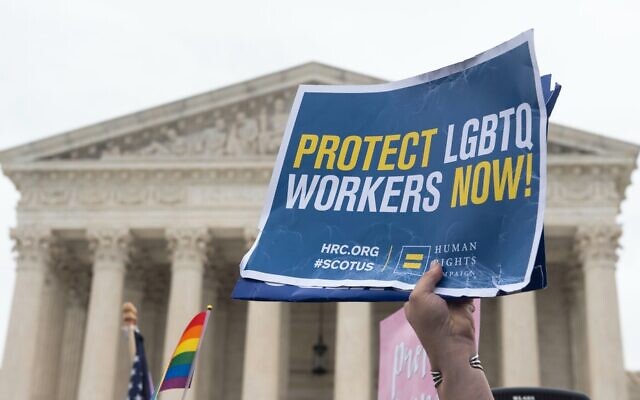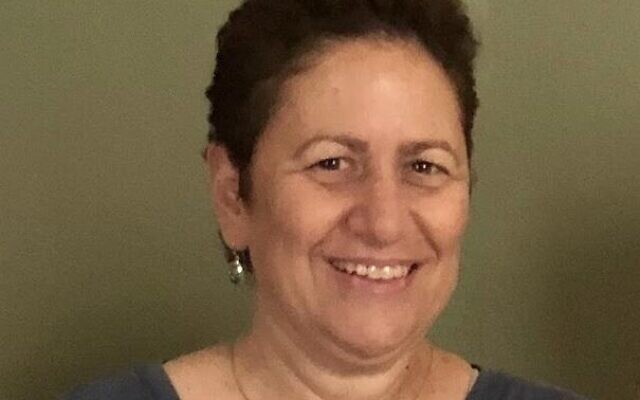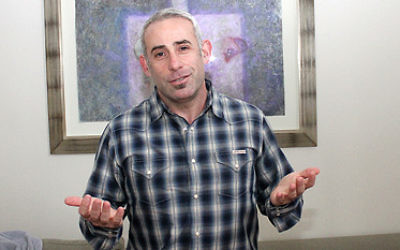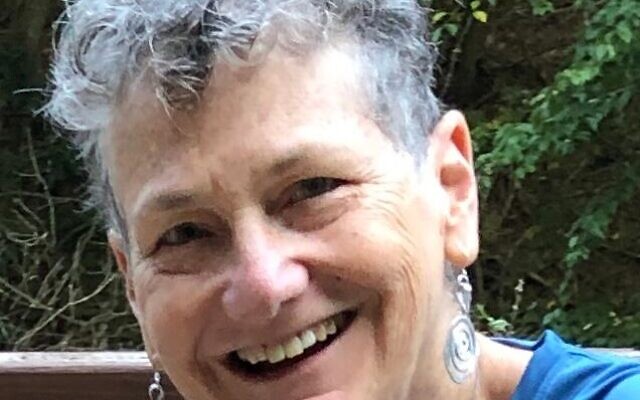Supreme Court Ruling 30 Years Later on Civil Rights Act to Protect LGBTQ
Robin Shahar lost her lawsuit against a Georgia attorney general, who revoked a job offer to her after learning she was to have a Jewish wedding with a lesbian partner.

Robin Shahar said she was “blindsided” by the U.S. Supreme Court ruling last week that the 1964 Civil Rights Act protects gay, lesbian and transgender employees from discrimination based on sex.
“I expected to lose the case, so I had put it out of my mind,” said the retired Atlanta attorney who had lost her own case decades ago when she sued the Georgia attorney general for rescinding a job offer to her after learning that she was going to have a Jewish wedding ceremony with her lesbian partner.

“I was floored. It took me half a day to realize that the attorney general can’t fire someone because they are gay,” Shahar told the AJT. “It is continuing to sink in. It is that monumental.”
In a 6-3 split decision June 15, with Justice Neil Gorsuch writing the majority opinion, the court decided against three employers in three different cases. One of the cases involved a child welfare coordinator for Clayton County in Georgia, who was fired after he joined a gay recreational softball league. “It is impossible to discriminate against a person for being homosexual or transgender without discriminating…based on sex,” Gorsuch wrote.
The surprise decision, according to Shahar, has wider and deeper ramifications than even the 2015 U.S. Supreme Court’s marriage equality ruling that same-sex couples have a fundamental right to marry under the Due Process Clause and the Equal Protection Clause of the 14th Amendment to the U.S. Constitution. That ruling required all 50 states and the District of Columbia to perform and recognize marriages of same-sex couples under the same terms as marriages of opposite-sex couples.
The latest Supreme Court ruling, Shahar said, affects “every single person. It’s not just about who we love.”

Rabbi Josh Lesser agrees with Shahar. “This has a sweeping impact on fundamental basic rights,” said the rabbi of Congregation Bet Haverim. Its mission statement still reads that its purpose is to serve the LGBT community. “Not all people will marry, but everyone will work. I’ve known so many people who have been closeted over the years because they were afraid to lose their jobs.”
Unlike Shahar, Lesser told the AJT that he had been watching for the court decision. “At best, we were hoping for a mixed response, so we were thoroughly surprised by the decision” and by the split in the justices’ decision. He added that he was relieved that the court hadn’t defined the term “sex” narrowly. The ruling “could have protected just gay and lesbians and not transgenders or the other way around. The justices didn’t make that distinction.”
To Shahar, the court’s decision was a “clear message on what is acceptable and what isn’t acceptable. Our jobs are where we spend most of our days. With this decision, people don’t have to choose between living honestly who they are and to have a job.”
It was Shahar’s honesty and openness back in 1991 that resulted in her losing her job. In 1990, she served as a law clerk in the office of Georgia Attorney General Michael J. Bowers while completing her studies at the Emory University School of Law, from which she eventually graduated in the top of her class. Bowers offered her a full-time position, which was to start in the fall of 1991. That summer, however, he learned that she was a lesbian who planned to have a Jewish wedding ceremony with her partner. After he withdrew the job offer, Shahar sued him.
In 1993, a district court ruled in Bowers’ favor, upholding the job termination, but two years later, a three-judge panel reversed the district court decision, ruling that the termination violated Shahar’s constitutional rights. In 1997, the 11th Circuit Court of Appeals reviewed the case and ruled for Bowers, after which Shahar petitioned the U.S. Supreme Court. It ultimately declined to review the case.
The latest Supreme Court ruling is a belated vindication for Shahar. But it doesn’t erase the “devastation” she felt at the time. Her then-partner, Fran Shahar, recalled that the couple “had already received death threats before the lawsuit” was filed. She remembers driving down her street, approaching their house and wondering if a swastika would be painted on it, or their dogs poisoned. “Neither of us knew whether we’d even get a job again. It’s hard to convey how horrible it was.”
The couple was married under a chuppah by Reconstructionist Rabbi Sharon Kleinbaum. “We weren’t only fighting as lesbians,” said Fran Shahar. “We were fighting as Jews. Bowers argued that our wedding with an ordained rabbi wasn’t protected by the First Amendment because it wasn’t really Jewish!”
At the time, most of the Jewish community agreed with Bowers and weren’t supportive of the couple, she added.
Eventually, both women found employment. Robin Shahar worked as an attorney for the City of Atlanta for 26 years before retiring. Her specialty was the First Amendment and constitutional law. “The First Amendment is near and dear to my heart. It’s what makes the United States the United States. I loved working for the City of Atlanta.”

Fran Shahar became a clinical psychologist and is the clinical director of mental health at the Pulaski State Prison in Hawkinsville. The two, however, divorced in 2009 and Robin remarried in 2016. Both are still members of Bet Haverim.
When she heard the recent Supreme Court ruling, Fran Shahar’s reaction was that it was “about time. I thought of all the incredibly brave women in the 1950s and 1960s who came out of the closet. This is their vindication,” she said.
Lesser points out how his congregation is “woven into the national decision” and history because of the Shahar case against the Georgia attorney general. “Both Robin and Fran and the congregation can now unabashedly celebrate” the ruling, he said. Lesser told the AJT that he received death threats the first three years of his leadership at the congregation.
But, noting the several weeks of street protests across the country in support of African Americans, Lesser added, “Until we recognize the full rights of all people, this is not a full victory.”



comments